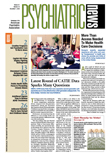Major health insurers and behavioral managed care companies operating in New York City have signed onto a commitment to increase screening for depression in primary care. And the companies have committed themselves in a“ charter” drafted in September to use a common instrument for such screening.
Leaders of the effort say they will be encouraging the use of the nine-item Patient Health Questionnaire (PHQ-9). That instrument is being used by the New York City Department of Health and Mental Hygiene (DHMH) in its effort to make screening for depression standard practice in primary care.
“It's a commitment on the part of the major commercial plans and managed behavioral health firms,” said Marilyn Wolff Diamond, M.P.H., director of quality initiatives for the New York Business Group on Health, which is spearheading the effort. “We will be developing common materials they can send out to the primary care physicians in New York City, including information about the PHQ-9 and why they should use it.”
Diamond told Psychiatric News that the effort was initiated by employers in the city seeking to lower costs associated with depression at the worksite, but said it was logical to “piggyback” on the existing effort of the DHMH to disseminate the PHQ-9 (Psychiatric News, November 17).
Psychiatrist Lloyd Sederer, M.D., executive vice commissioner of the department, said that for insurers it was important to agree on a common screening instrument and common educational materials. In the past, insurers have been developing their own separate protocols and materials, which have often been ignored by primary care physicians inundated with too much information.
The charter agreement is a commitment to speak with “one voice” about mental health, Sederer said.
The PHQ-9 was developed as part of the Primary Care Evaluation of Mental Disorders (known as PRIME-MD) diagnostic system by Robert Spitzer,M.D., and colleagues at Columbia University in col-laboration with researchers at the Regenstrief Institute at Indiana University.
Darrel Regier, M.D., M.P.H., executive director of the American Psychiatric Institute for Research and Education and director of APA's Division of Research, has also championed use of the instrument.
“The PHQ-9 has emerged as one of the leading methods for assisting both primary care physicians and psychiatrists to obtain a quantitative assessment of depression severity and treatment response,” Regier said when commenting last year on the effort by the New York DHMH (Psychiatric News, May 20, 2005).
“For the employer, an employee with depression may take excessive sick days or be present at work, but not perform well,” according to the charter signed by New York Business Group on Health and insurers in the city.“ Employers increasingly recognize the interplay between employee health and well-being and business performance. The costs of undiagnosed employees result in increased health care costs, absenteeism, and lost effectiveness while at work.”
The statement also says, “a coordinated and simple private-sector approach will be developed to improve the quality of depression diagnosis, delivery, and outcomes for employees and their families in the New York Metropolitan area. Success will be determined by demonstrating measurable improvements in percentage of people in the New York Metropolitan area diagnosed with depression, quality of practitioner performance, and level of employer engagement and support.”
The charter's authors hope that their effort will become “an example for collaborative initiatives across the country.”
Initial tasks will focus on
•
increasing the community's awareness of symptoms and diagnosis of depression,
•
educating primary care practitioners and other health professionals on the impact of depression on chronic illness,
•
standardizing primary care and health plan tools and processes used for depression screening, and
•
developing common tools to support primary care physicians and employers to enhance patients' and consumers' outcomes.
Diamond said the fourth of these tasks will include dissemination of information about appropriate referral of patients to psychiatrists.
Insurance companies signing on to the charter include Aetna, Cigna, Group Health Incorporated, HIP Health Plan of New York, Health Net, Magellan Health Services, Unitedhealth Group, and Value Options.
Information about the New York Mental Health Collaborative is posted at<www.nybgh.org>.▪
